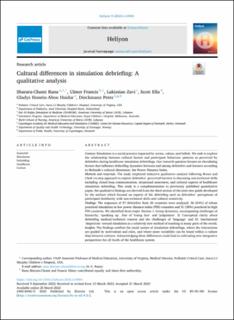| dc.contributor.author | Rana, Sharara-Chami | |
| dc.contributor.author | Francis, Ulmer | |
| dc.contributor.author | Zavi, Lakissian | |
| dc.contributor.author | Ella, Scott | |
| dc.contributor.author | Honein-Abou Haidar, Gladys | |
| dc.contributor.author | Dieckmann, Gerhard Peter | |
| dc.date.accessioned | 2023-06-26T11:13:08Z | |
| dc.date.available | 2023-06-26T11:13:08Z | |
| dc.date.created | 2023-04-20T09:45:31Z | |
| dc.date.issued | 2023 | |
| dc.identifier.citation | Rana, S. C., Francis, U., Zavi, L., Ella, S., Honein-Abou Haidar, G., & Peter, D. (2023). Cultural differences in simulation debriefing: A qualitative analysis. Heliyon, 9(4). | en_US |
| dc.identifier.issn | 2405-8440 | |
| dc.identifier.uri | https://hdl.handle.net/11250/3073204 | |
| dc.description.abstract | Context
Simulation is a social practice impacted by norms, values, and beliefs. We seek to explore the relationship between cultural factors and participant behaviour patterns as perceived by debriefers during healthcare simulation debriefings. Our research question focuses on elucidating factors that influence debreifing dynamics between and among debriefers and learners according to Hofstede's cultural dimension: the Power Distance Index.
Methods and materials
The study employed inductive qualitative analysis following Braun and Clark's 6-step approach to explore debriefers' perceived barriers to discussing non-technical skills including closed-loop communication, situational awareness, and cultural aspects of healthcare simulation debriefing. This study is a complementation to previously published quantitative paper, the qualitative findings are derived from the third section of the interview guide developed by the authors which focused on aspects of the debriefing such as debriefers' perceptions of participant familiarity with non-technical skills and cultural sensitivity.
Findings
The responses of 57 debriefers from 26 countries were analysed; 36 (64%) of whom practiced simulation in low power distance index (PDI) countries and 31 (36%) practiced in high PDI countries. We identified three major themes: I. Group dynamics, encompassing challenges of hierarchy, ‘speaking up’, fear of ‘losing face’ and ‘judgement’. II. Conceptual clarity about debriefing medical/technical content and the challenges of ‘language’ and III. Institutional ‘skepticism’ toward simulation as a relatively new method of teaching in many parts of the world.
Insights
The findings confirm the social nature of simulation debriefings, where the interactions are guided by motivations and rules, and where more variability can be found within a culture than between cultures. Acknowledging these differences could lead to cultivating new integrative perspectives for all levels of the healthcare system. | en_US |
| dc.language.iso | eng | en_US |
| dc.publisher | Elsevier | en_US |
| dc.rights | Navngivelse 4.0 Internasjonal | * |
| dc.rights.uri | http://creativecommons.org/licenses/by/4.0/deed.no | * |
| dc.title | Cultural differences in simulation debriefing: A qualitative analysis | en_US |
| dc.title.alternative | Cultural differences in simulation debriefing: A qualitative analysis | en_US |
| dc.type | Peer reviewed | en_US |
| dc.type | Journal article | en_US |
| dc.description.version | publishedVersion | en_US |
| dc.rights.holder | The authors | en_US |
| dc.subject.nsi | VDP::Samfunnsvitenskap: 200 | en_US |
| dc.source.volume | 9 | en_US |
| dc.source.journal | Heliyon | en_US |
| dc.source.issue | 4 | en_US |
| dc.identifier.doi | 10.1016/j.heliyon.2023.e14904 | |
| dc.identifier.cristin | 2142017 | |
| cristin.ispublished | true | |
| cristin.fulltext | original | |
| cristin.qualitycode | 1 | |

